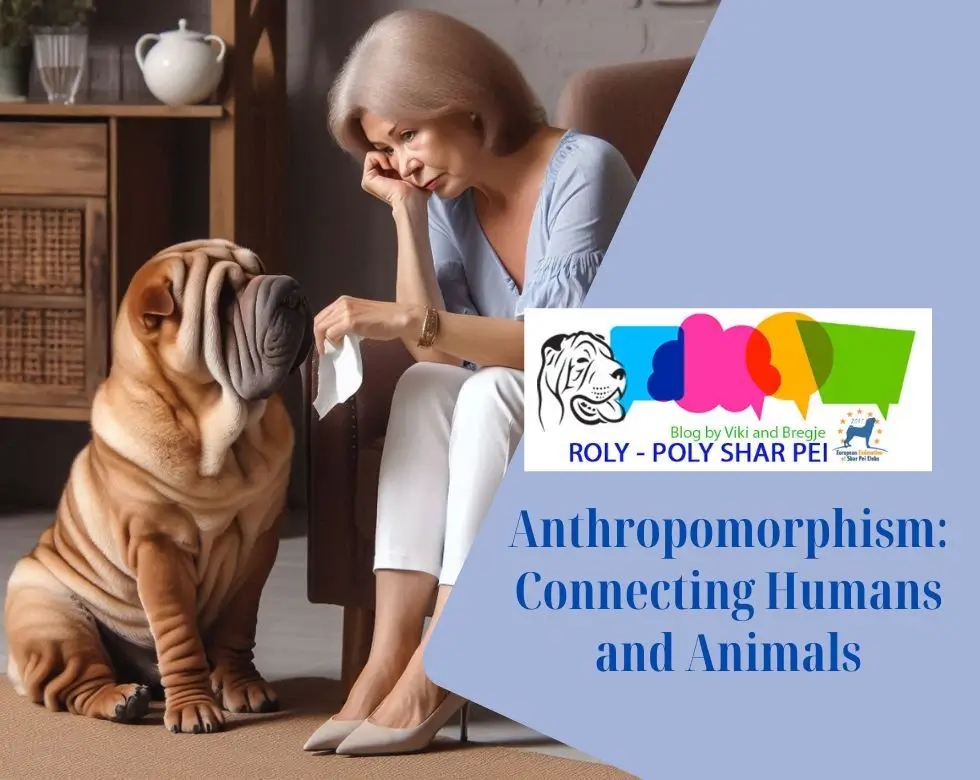Connecting Humans and Animals
You’re having a rough day, and you slump down on the couch, sighing dramatically. Your Shar Pei, Sir Wrinkles, walks over, sits down next to you, and rests his head on your lap, staring up at you with those soulful eyes. You could swear he’s saying, “Tell me all about it.” So, you start telling him about your boss, your overdue bills, and your annoying neighbor, and Sir Wrinkles just sits there, looking wise beyond his years. By the end of your rant, you feel a bit better, convinced your dog totally gets you. But does he really? This, dear Shar Pei friends, is anthropomorphism at its best!
Anthropomorphism is why we imagine our Shar Pei plotting mischief or understanding every word of our conversations.
Picture this: you come home to find your favorite shoes thoroughly chewed up, and your Shar Pei looks up at you with those wrinkly eyes, as if to say, “Who, me? I’ve been framed!” While this humanization can make our bonds stronger, it also means we sometimes expect them to act more like us than their true doggy selves.
On the bright side, anthropomorphism helps us forge stronger emotional bonds with our pets. Talking to your Shar Pei as if they understand every word can turn a bad day around to a good day. Imagine telling your Shar Pei about your terrible day, and they just sit there, head tilted, looking as concerned as any best friend could. This connection can improve our mental health and reduce stress. Our dogs become our therapists, even if their best advice is a slobbery kiss.
However, our tendency to humanize our pets can lead to some comical and not-so-comical misunderstandings:
Misinterpretation of Behavior: We might see our dog’s actions through a human lens. So, when your Shar Pei hides under the bed, you might think they’re feeling guilty about chewing those shoes, but they might just be scared of the vacuum cleaner!
Unrealistic Expectations: Expecting our dogs to understand complex emotions can set us up for disappointment. You might hope your Shar Pei will rescue you like Lassie, but in reality, they’re more likely to just look at you and yawn.
Risk of Humanization: Treating dogs too much like humans can ignore their actual needs. Sure, sharing a pizza with your Shar Pei sounds fun, but their tummy might not agree!
Communication Issues: Assuming our dogs understand human language can lead to some pretty funny moments. You might explain the house rules in detail, but don’t be surprised when your Shar Pei just wags their tail and goes back to napping.
Ethical Concerns: Attributing human motivations to our pets can skew our understanding of their true nature. Just because your Shar Pei gives you a sad look doesn’t mean they’re plotting an escape, they probably just want a treat.
Anthropomorphism isn’t just about how we see our pets; it’s everywhere in culture and media. Think of Disney’s Simba singing about his future kingdom or Pixar’s Dory with her cute forgetfulness. These characters, with their human like traits and emotions, make us laugh, cry, and connect deeply with the animal world. Who hasn’t felt empathy and cried watching Simba and Bambi or laughed at Dory’s adventures?
This human-animal connection also fuels our empathy towards real animals. When we see animals portrayed with human-like emotions, we’re more likely to rally for their cause. Imagine watching a documentary where a baby panda, with its wide, curious eyes, stares right into the camera. You can’t help but feel protective and want to ensure its safety and well-being.
In the end, while anthropomorphism makes our relationships with animals richer and more emotionally fulfilling, it’s essential to strike a balance. Understanding and respecting the natural behaviors and needs of animals like the Shar Pei ensures they stay happy and healthy while still allowing us to enjoy their unique companionship. So, next time your Shar Pei gives you that “I totally understand you” look, cherish the moment, but remember, they’re wonderful just the way they are, quirky doggy habits and all!




